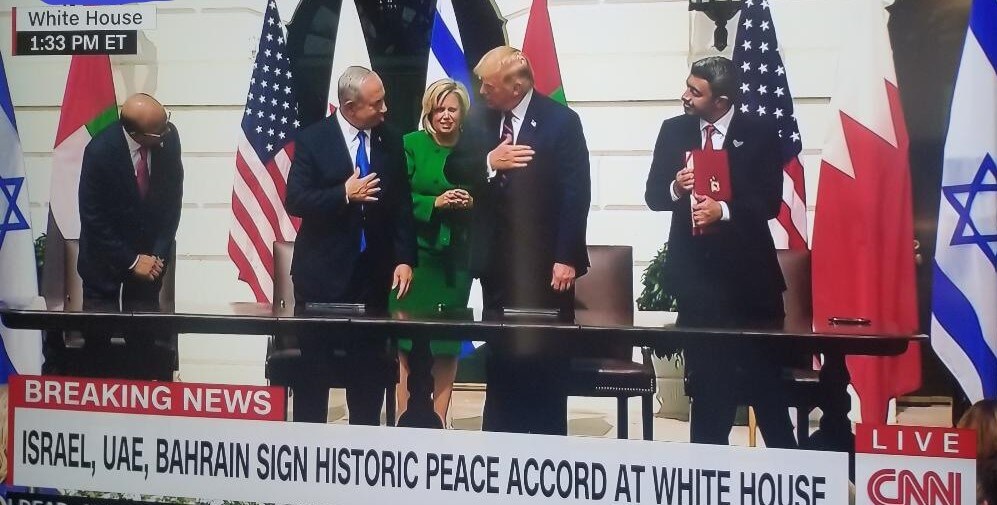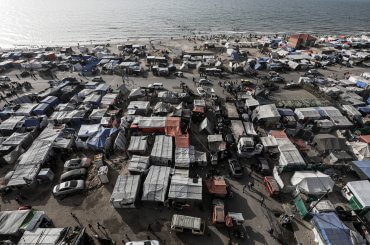Bahrain has become the fourth Arab nation to ‘normalise’ relations with Israel. As with the UAE, the agreement was unceremoniously declared by President Trump. Less surprised this time, Arab commentators on social media, especially in Palestine, Jordan, and Egypt, responded with ridicule as much as they did with anger and disappointment. This ridicule springs from the belief that Bahrain is not geo-politically or regionally significant. It is after all a tiny island with a small population and exercises very little global impact.
But is Bahrain truly insignificant, and therefore Bahraini normalisation with Israel isn’t critical? The attitude on social media largely reflects the pulse of the street, which in other words means, it represents the collective emotional orientation. It doesn’t always reflect the complexities of international relations neither does it speak for the countries’ official policies. Just because we as people see Bahrain as insignificant doesn’t mean the normalisation is.
Bahrain practically lives under the Saudi umbrella and hides behind Saudi muscles. It’s almost a Saudi protectorate. So it’s highly unlikely that the Bahraini ruler decided to go ahead with the Normalisation without at least an implicit Saudi approval. The Times of Israel reported that when Jared Kushner visited Saudi Arabia and Bahrain earlier this month, Bahrain’s king said his country would only move forward with normalisation in concert with Saudi Arabia, and that stability in the region relied on Riyadh.
At the moment, indications show that despite the regional changes Saudi Arabia may not be rushing toward Normalisation. Not until after the US election at least. It might be that for some in the House of Saud the heart is willing but the flesh is weak. The Saudi ambassador to the Arab League reiterated the Kingdom’s commitment to the so-called Arab Initiative which stipulates that normal relationships with Israel are conditioned on the establishment of a Palestinian State. These may be words, and words, as Bahrain had unequivocally showed, don’t mean much. But in reality, as a Saudi writer pointed out, the Kingdom has a lot more to lose than the UAE and Bahrain, and a lot more to offer to Israel if Normalisation takes place.
Despite the wide-spread anger over the war in Yemen, Saudi Arabia still enjoys a prominent position for most Arabs and Muslims, Palestinians included. Not least because it is the cradle of Islam and the home of Islam’s first and second holiest sites, Mecca and Medina. It is also the most important financier of Islamic centres and communities worldwide. Normalising with Israel will cause the Kingdom to lose much of its credibility, leverage, and respect among the majority of Muslims who still see Israel as a settler-colonial project planted in the heart of the Muslim world. Normalising will also mean that what Saudi Arabia loses, will allow other Sunni Muslim countries like Turkey and/or Egypt to move in and fill the gap.
There is also the unpleasant scenario that losing the Kingdom’s standing in the Muslim World will only heighten the Iranian influence in the region, especially amongst Palestinians. Palestinian Hamas and Islamic Jihad are already seeing growing relations with the Islamic Republic. Those relations will only increase as official Arab support diminishes. In fact, there are now some Palestinian calls to move closer to Iran and Turkey. The recent trip of chairman of Hamas’ political bureau Ismael Haniyeh to Istanbul and then Beirut couldn’t be a better indication of this new paradigm. While Saudi Arabia arrests Palestinians and Jordanians over ties with Palestinian resistance movements, Iran continues to supply Gaza with advanced weaponry and expertise. Normalising with Israel will mean that the last hair that the Palestinian national liberation movements have had with Riyadh will be severed, or at least become heavily strained.
In fact, there are serious concerns that a Saudi involvement with Israel will only lead to more tightening of measures against the Palestinian cause. This assumption is based on the Palestinian experience with Egypt’s President Abdel Fattah al-Sisi and the UAE, and a history of Arab abandonment. A recent investigative documentary by Aljazeera Arabic this week, for instance, revealed that one of the crucial tasks of Egypt’s newly established Bernice military base in southern Egypt on the Red Sea is to clamp down on weapons and supplies heading for Gaza from Iran and Syria. The base was fully financed by the UAE and in full coordination with Israel. In fact, crucial to trying to blackmail Sudan into normalisation with Israel is the cut-off of the Palestinian supply lines, and to force Palestinian factions to accept Trump ‘peace deal.’ We are no longer talking about Arab regimes turning a blind eye to Israel’s policies, but proactively helping Israel crack down on Palestinian dissidence.
As an influential country, the Kingdom might not want to be seen as a violator of the Arab League’s resolutions, much less its own principles and initiatives. Late King Abdullah Ben Abdul-Aziz launched in 2002 the Arab Peace Initiative which stipulated that full withdrawal from the territories Israel occupied in 1967 and the establishment of a Palestinian state will be the only way for Arab countries to fully normalise relations with the Jewish State. The initiative, in place for a long time, raises very serious questions about Israel intentions and goals. Surely, had Israel been truly interested in peace, it would’ve jumped on the initiative immediately. The problem is that Israel has always been interested in peace without a price. And this is exactly what the normalisers have given the Zionist state.
More importantly, the internal dynamics of the Kingdom are different from those in the UAE and Bahrain, despite their close ties. Crown Prince Mohammed bin Salman is yet (if ever) to establish his grip over the Kingdom. There are multiple levels of opposition to his authority among members and groups within the royal family, the religious institution, and the military. And then there’s the growing resentment among large swaths of the people who, among other things, refuse to recognise or deal with the Jewish State. These people see any ties with Israel as a violation of the Kingdom’s long-held beliefs and an encroachment upon the principles set by late King Faisal who stressed that the Kingdom would not recognise Israel even if all the Arabs did. But it’s important to note that within the Kingdom there’s also a current, which emerged in the wake of the Yemen war, that sees in the Palestinian cause a marginal issue. This current represents a modern form of Saudi nationalism, if not chauvinism.
The truth of the matter is that none of the above considerations has stopped Saudi Arabia from having relations with Israel. But the Saudis seem adamant to keep these relations clandestine, which explains why — amidst and despite the normalisation fever – bin Salman pulled out from a planned meeting with Netanyahu in Washington after the news had leaked to the media.
The Bahraini Normalisation will not necessarily be lucrative economically or technologically for the people of Bahrain, let alone be largely accepted by them. It is very unlikely it’ll provide a so-called protection against the Iranian threat. The Egyptian and Jordanian experience proves that only Israel and nobody else benefits from ties with the Arabs.
But the significance of the Bahraini Normalisation lies in providing Saudi Arabia with a backdoor to deal with Tel-Aviv unhindered, something of a Saudi embassy for normalisation, if you will. This among other things will fulfil some of the Saudi strategic needs without the Kingdom necessarily abandoning its long-held positions, at least publicly. As a seemingly neutral land, the Kingdom won’t be required to deal with the ideological, religious, and political controversies and backlash that an official Saudi Normalisation may cause internally and across the Arab and Muslim World. There are still many critical questions about the long-term strategic values of such alliances, and many more concerns about Israel’s existence in the Gulf leading to disasters, not necessarily to Iran, but mainly to the Arab dictators who jumped blindfolded on the Zionist bandwagon.



And here’s a response to the “normalization” from Americans for Peace Now:
https://www.jta.org/2020/09/15/opinion/normalizing-relations-with-the-uae-does-nothing-to-help-fix-israels-existential-problems
I’ve been asked why a pro-Israel Jewish peace organization like mine is not enthusiastically celebrating the signing of a peace deal between Israel and two important Arab states…Normalization with the UAE and Bahrain is great for the venture capitalists who will benefit from it, but does nothing to remedy Israel’s existential problem: its conflict with the Palestinians and the occupation that does so much damage…It’s hard to celebrate when the occupation continues and deepens. As Netanyahu and his aides are discussing normalization with their Emirati counterparts, they are also advancing plans to build a settlement in the strategic area of the West Bank known as E-1, the corridor between Jerusalem and the Jordan Valley. As they are negotiating with Dubai and Abu Dhabi, Israeli officials are pushing plans for a settlement in Givat Hamatos on Jerusalem’s southern border. These settlements strike at the heart of any plan for a contiguous and viable Palestinian state.
The “normalization” really boils down to an opportunity to sell even more heavy weapons into the Middle East plus increased opportunities for spying and surveillance.
And these are not democratic states at all, not any of them.
Hard to see anything to get excited about.
Rather, as in so many matters abroad, Trump’s efforts are actually increasing the possibilities for future and larger wars.
War is peace, Mr Orwell said.
https://www.nbcnews.com/think/opinion/trump-peace-deals-israel-uae-bahrain-are-shams-they-boost-ncna1240085
“Noura Erekat: Trump deals for Israel, UAE and Bahrain are shams. They boost oppression, not amity.”
Sept. 15/20
By Noura Erakat, human rights attorney
EXCERPT:
“As President Donald Trump presides over a White House ceremony Tuesday that celebrates the establishment of diplomatic ties between Israel and the United Arab Emirates, boosted by Friday’s announcement that the Kingdom of Bahrain and Israel will normalize relations, the world needs to see this charade for what it is.
“Friday’s development was framed as a peace agreement, but Bahrain and Israel were never at war. In fact, they had already enjoyed unofficial diplomatic, security and trade relations. While Trump may be looking to score points as a peacemaker for his presidential bid, what he is doing is simply providing the military, financial and diplomatic infrastructure to further repress popular struggles for democracy and freedom in the Middle East.
“As a result of its agreement with Israel, the UAE can purchase high-tech weapons from the United States, including Reaper drones, EA-18G Growler jets and F-35 fighter planes. Bahrain, which stands to similarly benefit as it seeks air defense systems from the United States, is yet another Arab state eager to secure the superpower’s military backing and diplomatic impunity for gross violations of human rights and the laws of war.
“The agreement between Israel and Bahrain reflects a geopolitical alliance between repressive regimes that expands the U.S. sphere of influence in the Middle East, rather than indicating a cessation of violence or an easing of oppression.
“Historically, Arab states have refused to normalize relations with Israel until it guarantees Palestinian national rights. But Bahrain, like the United Arab Emirates most recently, did not secure a single lasting concession for Palestinians in its agreement with Israel — not even to slightly ease the 13-year blockade of Gaza, which has turned the tiny coastal enclave into an open-air prison.
“Like Israel, which has been spared international accountability at least 43 times (the number of U.S. vetoes in the U.N. Security Council to block initiatives to address Israel’s treatment of Palestinians), the Kingdom of Bahrain has a vulgar human rights record and stands to benefit from U.S. tutelage.”
“some Palestinian calls to move closer to Iran and Turkey”
Of course as you lose other allies you look to Israel’s remaining staunch enemies to gang up against Israel. That ultimately will prove unproductive; it is a strategy of desperation, that will do nothing to improve the lot of the Palestinians.